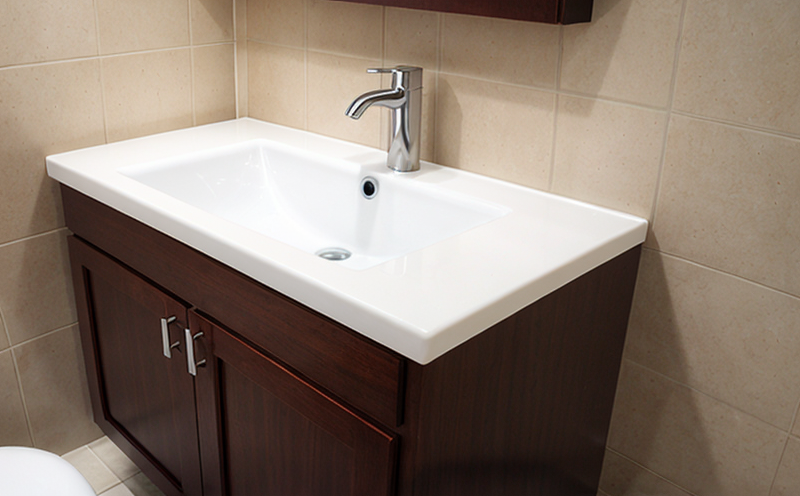IEC 61010 Dielectric Strength Testing of Sanitary Plastic Devices
The International Electrotechnical Commission (IEC) Standard IEC 61010 is a crucial guideline for the testing and certification of electrical equipment, including sanitary plastic devices used in bathroom and sanitary applications. This standard ensures that products are safe to use by meeting strict requirements regarding insulation resistance and dielectric strength.
Dielectric strength testing evaluates how much voltage can be applied before insulating materials like those found in sanitary plastics begin to break down or fail. For bathroom and sanitary plastic devices, this is particularly important because these products often come into direct contact with water and other conductive fluids. Failure of insulation could lead to electrical shorts or even electric shocks.
The testing procedure outlined by IEC 61010 involves applying an alternating voltage across the insulating material while monitoring for dielectric breakdown. This process is conducted under controlled environmental conditions, typically at a temperature and humidity level that mimic real-world usage scenarios. The test specimen must be prepared according to specific guidelines provided in the standard.
The apparatus used for this testing includes specialized high-voltage generators capable of applying the required voltage levels safely and accurately. The specimens are mounted on suitable supports to ensure they are positioned correctly during the test. Additionally, the setup may include protective barriers or enclosures designed to prevent any risk of electrical shock to personnel.
Once the specimen is properly prepared, it undergoes a series of tests which involve applying increasing voltages until either dielectric breakdown occurs or the specified maximum voltage has been reached without failure. The test results are then documented meticulously and compared against acceptance criteria defined in IEC 61010.
- Industry Applications: This standard is widely used by manufacturers of bathroom fixtures such as shower heads, bidets, water closets, etc., to ensure their products meet safety standards before being marketed.
- International Acceptance and Recognition: IEC 61010 has been adopted globally due to its rigorous approach towards ensuring electrical product safety. Compliance with this standard enhances brand reputation among consumers who prioritize health and safety when purchasing bathroom accessories.
The importance of meeting the requirements set forth by IEC 61010 cannot be overstated, especially in sectors where direct contact between people and water is common. By adhering to these standards, manufacturers demonstrate their commitment to quality control and consumer safety.
Industry Applications
- Bathroom fixtures like shower heads and bidets are critical areas where dielectric strength testing is essential. These products must withstand high water pressure while maintaining integrity of their insulating materials.
- Water closets also require stringent electrical safety measures, particularly in public restrooms where continuous use can exacerbate potential hazards if not properly designed or manufactured according to international standards.
The application extends beyond just manufacturing. Regulatory bodies often mandate compliance with IEC 61010 during product certification processes. This ensures that only those products deemed safe by independent laboratories can enter the market, protecting both users and manufacturers from liability issues associated with substandard goods.
International Acceptance and Recognition
- IEC 61010 has gained widespread recognition across various countries due to its comprehensive approach towards assessing electrical insulation performance. Many nations have incorporated parts of this standard into their national regulations.
- The International Electrotechnical Commission itself plays a pivotal role in promoting uniformity and interoperability within the global electronics industry, making IEC 61010 an integral part of international trade practices involving sanitary plastic devices.
By adhering to these globally accepted standards, manufacturers can ensure their products are not only compliant with local laws but also meet expectations set by consumers worldwide. This fosters trust between producers and end-users, encouraging broader adoption of innovative bathroom technologies.
Use Cases and Application Examples
Let's delve into some real-world applications where IEC 61010 dielectric strength testing plays a vital role:
- Shower Head Testing: Ensuring that the internal components of shower heads remain free from electrical breakdown under normal operating conditions.
- Bidet Functionality: Verifying that bidets maintain their insulation properties even when exposed to frequent water flushes and potential moisture accumulation inside the device.
In addition to these specific examples, there are numerous other scenarios where this type of testing is necessary. For instance, manufacturers may need to demonstrate compliance during product development phases or as part of ongoing quality assurance programs. These tests help identify any weaknesses early on so that corrective actions can be taken promptly.





